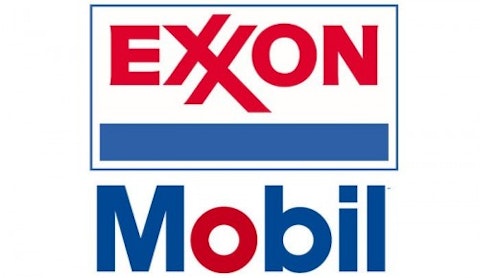Government bonds, certificates of deposit and money markets were once the mainstays of retirement portfolios. The rates of return these conservative investments earn have dwindled to the point where boomers can no longer rely upon them the way their parents and grandparents did.
So, as they look beyond the tried and true in an effort to secure their retirements, should boomers turn to energy exploration stocks such as Exxon Mobil Corporation (NYSE:XOM), ConocoPhillips (NYSE:COP) and BP plc (ADR) (NYSE:BP)? Well, the answer to that question is at least a qualified “yes” because these corporations are bolstered by immense financial reserves and the industry shows signs of continued expansion.
ConocoPhillips could benefit from shale-gas exploration
With a market capitalization of almost $75 billion, ConocoPhillips (NYSE:COP) obviously enjoys a very firm financial footing. And analysts predict that ConocoPhillips (NYSE:COP)’s EPS for 2013 will be $5.48 with performance climbing to $6.02 for 2014, an uptick that bodes well for its continued future profitability.
But one fact might be even more indicative of its potential for ongoing expansion. ConocoPhillips (NYSE:COP) is considering splitting its U.S. operations from its other divisions, a move that could position shareholders to garner impressive profits from the production of shale gas. The flow of new crude oil from fields scattered from North Dakota to south Texas helped boost U.S. production during 2012 to 8.9 million barrels a day, an increase of 14% over the previous year’s total.
ExxonMobil has the heft to take risks
At this point, Exxon Mobil Corporation (NYSE:XOM) is one of the only American-based energy companies that still simultaneously explores, refines and markets fuels worldwide. Lacking the resources to become involved in all aspects of the industry, most other oil companies simply sell their fuel to a refinery or purchase crude and refine it for sale at their gas stations.
And looking to the future, Exxon Mobil Corporation (NYSE:XOM) is being sought after as a partner to participate in exploration projects in yet-to-be-discovered Arctic and deepwater fields. It is also positioned to be a major player in the Canadian tar sands and the exploration of Bakken Shale reserves in North Dakota.
These undertakings come with some considerable risk. But even if, for example, Canadian exploration becomes unprofitable, that outcome would not prove nearly as disastrous for Exxon Mobil Corporation (NYSE:XOM), whose revenue for 2014 is projected to top $437 billion, as it would for a smaller company.
BP: Developing countries will provide a valuable market
Natural gas consumption in Asia grew by 9.9% during 2012. And that same year, oil consumption in China climbed by 5%, a figure below the 10-year average but still substantial results. This upsurge will likely intensify as these countries continue to urbanize, a process that will be helped along by the Chinese government pushing an estimated 250 million people to settle in cities.
And any profits BP plc (ADR) (NYSE:BP) might gain as it responds to China’s ever-increasing demand for fossil fuels are only one portion of the total picture. In June, BP along with its partner Zhuhai Port, received final approvals from the Chinese government to construct a purified terephthalic acid (PTA) plant at Zhuhai, Guangdong where two similar facilities are already located.
This facility, which is slated to become operational during late 2014, will have the bulk to produce 1.2 million tons of PTA a year. BP played a major role in the development of this petrochemical, which is utilized worldwide in food packaging and textiles
A Foolish conclusion
It might be exciting to look ahead and envision the profits that BP could gain from expanding markets in China and elsewhere around the world. However, the recent announcements about the lending practices of major banks could prevent BP’s Chinese operations from ever living up to their “promise.”
And that company’s ongoing legal entanglements, including possible criminal cases, emanating from the Deepwater Horizon oil spill might dampen its earnings for the foreseeable future. If nothing else, continued public scrutiny of this incident could push BP to spend considerable resources on public relations efforts aimed at bolstering its image.
However, a closer look at ConocoPhillips (NYSE:COP) and Exxon Mobil Corporation (NYSE:XOM)’s strong fundamentals seemingly indicate that they are reasonable considerations for boomer’s retirement portfolios. ConocoPhillips’ annual dividend rate stands at 4.3%, a yield far beyond what boomers might earn from more conservative investments. And the fact that this company’s 52-week stock price history shows a gain of 9.9%is also encouraging.
Exxon Mobil Corporation (NYSE:XOM)’s growth rate for 2013 is projected to be 8.1%, a statistic that should reassure boomers looking to secure their retirement. And this company’s return on equity, 28.3%, as well as its return on assets, 10.2%, point to effective management. Analysts predict that ExxonMobil’s EPS for the fiscal year ending December 2014 will be $10.84.
The article Are Energy Exploration Stocks Worth the Risk? originally appeared on Fool.com and is written by Harriet Tramer.
Harriet Tramer Tramer has no position in any stocks mentioned. The Motley Fool has no position in any of the stocks mentioned. Harriet is a member of The Motley Fool Blog Network — entries represent the personal opinion of the blogger and are not formally edited.
Copyright © 1995 – 2013 The Motley Fool, LLC. All rights reserved. The Motley Fool has a disclosure policy.




